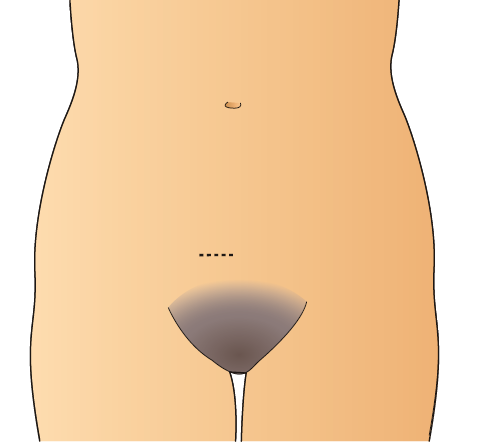
Tubal Ligation
A permanent method of contraception for women
Tubal ligation commonly called “getting your tubes tied” is a safe and effective surgical procedure that permanently prevents pregnancy.
It prevents an egg from moving from the ovaries down to the uterus through the fallopian tubes. This procedure also blocks sperm from travelling up the fallopian tubes to the egg and doesn’t affect your menstrual cycle.
A surgical procedure for providing a permanent contraceptive solution
Tubal ligation is a contraceptive method suitable for women who are sure they don’t want any more children.
Tubal ligation involves a short procedure, usually 15-20 minutes long, and offers highly effective protection against pregnancy, so has no effect on a woman’s hormones, so have no effect on a woman and her partner’s sex life.
How do I know I am ready to get my tubes tied?
You should carefully weigh your decision to undergo this procedure. Though tubal ligation has been successfully reversed in some people, the procedure is meant to be permanent.
What to expect at your appointment
The procedure is performed by a highly trained expert and takes approximately 15-20 minutes.
It is carried out under local anaesthetic and sedation, using simple techniques to seal the fallopian tubes. After this procedure has been performed, an egg cannot move from the ovary through the tubes (a woman has two Fallopian tubes), and eventually to the uterus.
Will I get my period after getting my tubes tied?
Having your tubes tied does not affect your menstrual cycle; you will continue to experience your period as usual. It does not induce menopause either. If you experienced irregular periods before the procedure, irregular menstruation will probably persist following sterilization.

Frequently asked questions about tubal ligation
Tubal ligation involves closing a woman’s fallopian tubes. The fallopian tubes normally carry an unfertilised egg to the womb.
Closing the fallopian tubes prevents the egg and sperm from meeting, so a pregnancy cannot occur. Female sterilisation is a quick and safe surgical operation. It needs to be done by a trained health provider.
The tubes can be closed in several ways. One method is to make one small cut in the lower stomach to see the tubes on each side of the womb and then cut the tubes. The other method is to place a small camera and other instruments through a hole in the stomach to see the tubes, which are then clipped.
Female sterilisation is an excellent way to prevent a pregnancy. It is an effective way to permanently prevent you from having any further pregnancies.
-The operation works straight away. As soon as you have a female sterilisation it will prevent a pregnancy.
-It is permanent, so you do not need to remember to use contraception again.
-It does not interrupt sex or affect your sex life. After sterilisation, you can still experience an orgasm.
-Having a female sterilisation does not have any negative effects on the rest of your health.
-You are likely to continue to have normal periods after sterilisation.
-You can have the operation straight after an abortion.
If you’re considering tubal ligation, or thinking about using a new method of contraception, it’s a good idea to have a full consultation.
Find our locations that offer tubal ligation and related services
Tubal ligation aftercare
After recovering from the initial anaesthetic of the procedure and completing a few minor checks, you’ll be allowed to go home.
Our service providers will provide you with a detailed guide of what to expect after the surgery and are on hand to answer any questions you may have.
It is completely normal to feel some discomfort and you should consider a few days of rest immediately after the procedure.
Some women experience vaginal bleeding or spotting. We recommend using a sanitary towel if you experience any bleeding. Discomfort, similar to period pain, is also common, and you may be prescribed painkillers for this. Contact us or your doctor for advice if you are still experiencing excessive pain after taking painkillers.
Depending if you have stitches and/or a dressing over your wound, we will advise caring for your wound following the surgery. Generally, however, you should be able to resume showering or bathing as normal once the dressing is removed.
Your sex drive should not be affected by the operation, and you can start having sex again as soon as it feels comfortable to do so. Long-term partners may not need to use other forms of contraception to prevent pregnancy but remember that tubal ligation will not protect you from STIs.
Find your best fit
If you’re unsure what method is best for you, take our online contraception quiz.

Other contraceptive methods
We offer a range of contraceptive and sexual health services to suit you.












